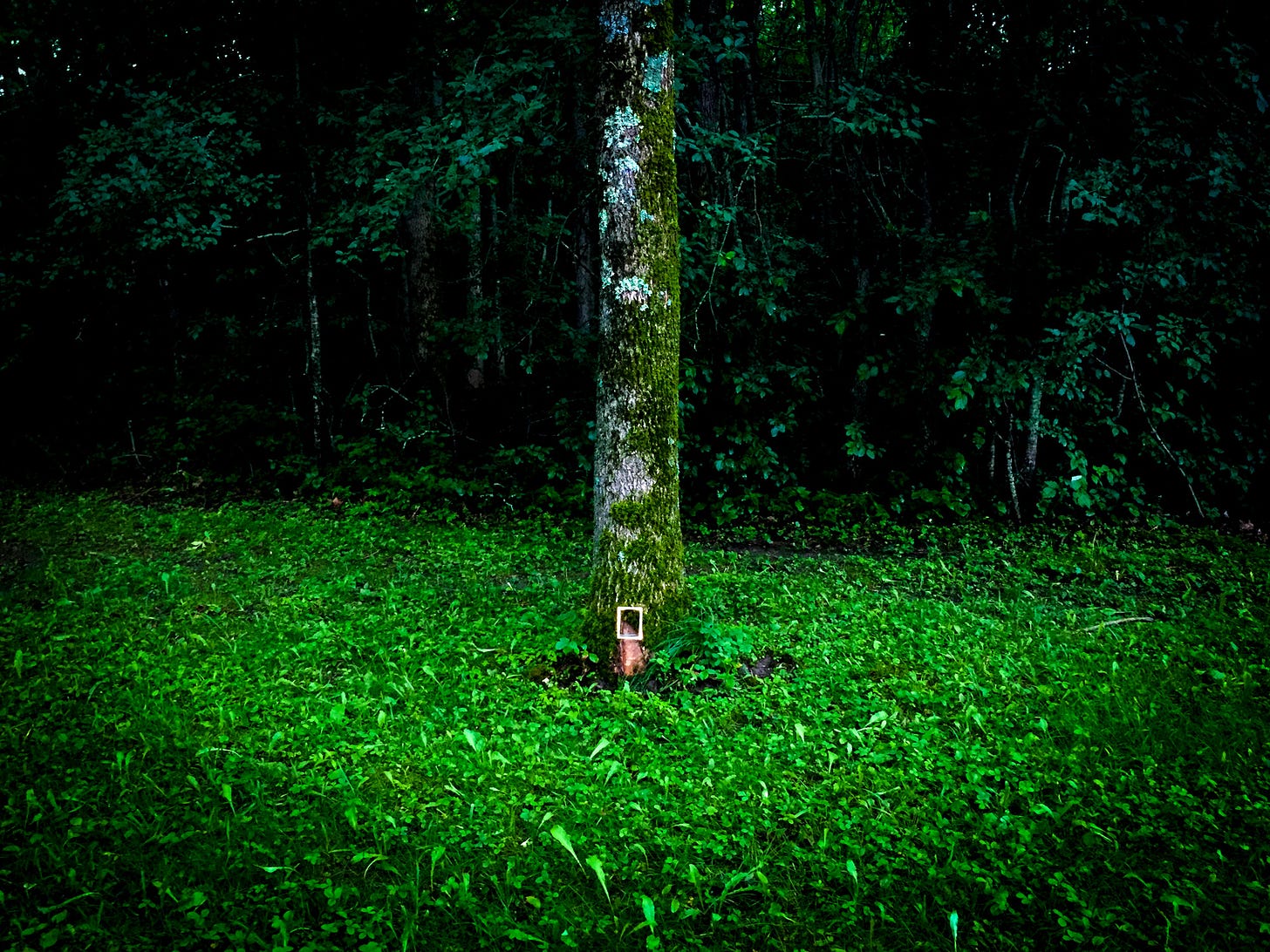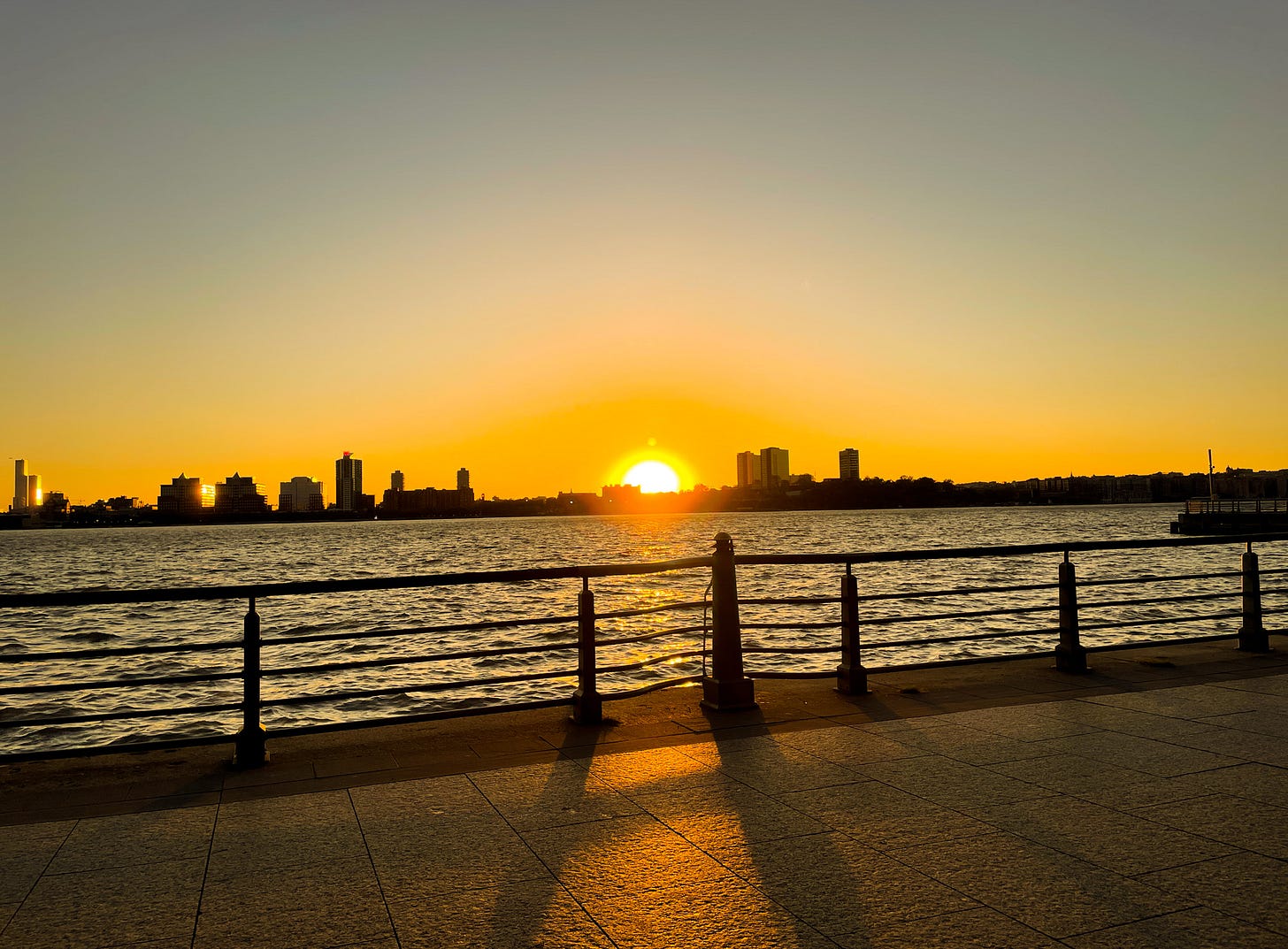Welcome to this eighteenth reflection on In Fragments — this week exploring A Witness to Life, a ritual to honor the closing of a digital storytelling community:
A couple weeks ago I left the raging New Mexico wildfires to begin the journey back to Vermont. Along the way, I stopped in Tulsa Oklahoma to visit the newly opened Bob Dylan Center, where I encountered this summary of Dylan’s philosophy:
Nothing is true and everything is allowed.
It reminded me of Werner Herzog’s notion of ecstatic truth — that deeper truths can only be accessed through invention and imagination, that the prosaic “factual truth” is merely the truth of accountants, incapable of delivering any true illumination.
In this age of information warfare, conspiracy theories, fake news, deep fakes, and alternative facts, it is important to understand the power of framing — that in reality, framing matters more than facts. I recently had the chance to experience the truth of this in practice. I was on retreat in the wilderness of New Mexico, where I paired up with a partner. We took turns telling our life stories to one another as victim narratives — after every detail, no matter how positive, we concluded with a negative framing (some kind of “but”). Then, we switched partners and took turns telling our life stories as hero narratives — after every detail, no matter how challenging, we concluded with a positive framing (some kind of “and”). It was astonishing to witness the difference. In the first pairing, we felt exhausted, depleted, depressed, and eager to escape the conversation. In the second pairing, we felt energized, engaged, elated, and eager to continue conversing. The facts in each case were essentially the same; all that really changed was the framing.
When we emerged from the wilderness, I remember turning on my cell phone for the first time in a week and pulling up The New York Times. As I scrolled through the headlines, all I could see was negative framing. The factual content of the headlines hardly seemed to matter at all; what I saw instead was their energy — fear, shock, panic, outrage, anxiety, blame, horror, futility. When we’re constantly force-fed a diet of such negativity, is it any wonder that so many negative situations continue to persist in the world?
Information truly is food — and the phrase “you are what you eat” applies just as much to media as it does to meals. As we take information into our bodies, we’re shaped by what we consume. As the saying goes: you’ve been framed.
Hoping to create an oasis of positivity, sincerity, and connection, I built an online storytelling tool called Cowbird from 2009–2011. I envisioned Cowbird as a free (and ad-free) space for people around the world to share their life stories, which could then be automatically interconnected together through metadata, in order to create a “public library of human experience” as a learning resource for the commons.
The early Cowbird captured the hearts and imaginations of people in almost 200 countries, who used it to share around 100,000 personal stories. It was a beautiful space to witness. However, as time passed, many Cowbird authors drifted away to newer platforms like Instagram and Medium, and Cowbird began to exhibit the same dynamics as other social media spaces — users competing for followers, comments, and likes. Despite its pure intentions, Cowbird was becoming yet another attention economy. So in 2017, after five years of operations, I decided to close Cowbird to new contributions, pledging to keep it online as an historical archive instead. Some of Cowbird’s most passionate users were saddened by this decision, so I invited them to visit me in Vermont that summer, to meet one another in person.
In this eighteenth ritual of In Fragments, I create a grieving ritual for the closure of the Cowbird online community. I prepare a collection of my mother’s silver picture frames by removing their glass and their backings. I place these empty frames in a lush grove of ash trees down by the water at High Acres Farm. I invite around forty Cowbird authors to enter the grove with bare feet and in silence. Each author is invited to choose a silver frame to take home as a gift. The frames are hung to highlight exquisite elements of nature: pieces of moss, delicate leaves, rough gray bark.
As the authors find their frames, they use them to frame the views of what they see around them. They begin to understand that every moment of perception is in fact an act of framing: that where and how we choose to look determines what we see.
The negative framing of my experience with Cowbird might be that it sucked up multiple years of my life without much to show for it, that it never achieved the ubiquity of other more popular platforms, and that it never became the “Wikipedia of human experience” that I had hoped. The positive framing might be that it was the right tool for a particular moment in time that subsequently passed, that it created some beauty in the world for a while, that its closure helped me and others learn to let go of containers that no longer feel true and alive, or that its most passionate fans helped to seed a new energy of arts and culture here at High Acres Farm by participating in this ritual with me, for which I continue to be very grateful.
In closing, I’d like to share a beautiful scene I witnessed last week while visiting New York City. I was sitting on a bench on the west side of Manhattan, watching the sun go down over the Hudson River, as the light sparkled off the water, casting the city in a wondrous golden glow. Two old men were sitting next to me on the bench. One of them was African-American, and looked as though he may have been homeless. The other one was Caucasian, with a well-groomed white beard and a small straw hat. As far as I could tell, both men were mute. They were gesturing to one another without speaking — not using sign language, but simple universal gestures that anyone could understand. The first man waved his hand at the setting sun, and then he moved his hand to his heart, patting his chest several times. Then with both hands he made wide radiating motions outwards from his heart, as if the sunlight were emanating from within him. Then he moved his hands to the sides of his eyes, and made the motion of crying, as though tears were falling down his cheeks. Then he moved his hands to the edges of his mouth, and made the motion of pulling his mouth into a smile, while flicking away his imaginary tears. The other man was watching him this whole time, nodding emphatically, as if to say, “I know. I know.” They continued like this for almost an hour, marveling at the great beauty of the sunset before them, while runners and rollerbladers whizzed by, oblivious to their silent exchange. When the sun finally set, the two men got up from the bench, raised their hands to bow to one another in gratitude, and then set off in their separate ways, as twilight wrapped around them.
— Jonathan









An exquisite piece. Close to my heart for many reasons. You know.
The first is that for 33 years I was a professional journalist. Eons ago. Yes, news organizations have, do and will continue to tell stories through a negative frame. News is about things that go wrong. It makes a better story when something has gone bad. But there is purpose in that, though; we journalists saw it as a duty to shine light on darkness, to expose a wrong so that people will take notice and make it right. Sadly, I feel those days are gone; news organizations no longer have the trust and power and strength to make people listen. And what we are given is an over abundance of misinformation, material no longer graced with editing or fact-checking or common sense.
I wonder if the time is right for news that is framed in a new way.
There's another layer to the "news" problem: Stories are always in past tense. They are about things gone wrong in the past. The pundits dabble in the future tense (with all the accuracy of a backwater fortune teller). The stories are about things that have happened or might happen, expressed in ways that get us worried and frantic and angry and we stop listening because we feel so powerless.
News should be in the present tense. It is closer to the truth. Witnesses. Participants. Greater accuracy. Consider the impact of George Floyd's death. But how much of that can we absorb? How much damage does that do to our own sense of being and purpose and possibility.
Now a word on cowbird.
I read your framing of that experience but I must say it is much different than mine. Both framings. And particularly in regards to you. I think you should rework your hero framing.
Here's how I frame it: You gave me voice. You taught me a new way to write. You got me back into photography. You introduced me to people I would never have met who had stories I would never have heard. You did that. You and David. You created the place, the platform, the technology for us to create and share.
You created a community. Now I know that wasn't exactly what you had in mind, but I think, in the end, it was a far more important achievement than you realize. We built friendships. We learned from each other, tried things out in different ways, opened up, took creative risks. We flourished.
And boy was it good. The writing. The sound (think: call to prayer). The photographs. The people. From Norway and Spain and The Rez and Africa and Europe and Russia and all over the fucking world. Cowbird people taught me things. Opened my eyes to things. Made me feel things.
That's how I'd frame cowbird.
Yes, it reached an end. The smallness and quality and energy of its early days was diffused by its growth. And baser instincts of trying to stand out in the crowd. But the "reunion" was magic. Great fun. A fitting farewell to what had brought us together, a time in our lives when we felt good. We mourned what he had and what was no longer. We saw that we had moved on, gotten older, had more experiences, continued our lives.
Thank you for all that.
And thank you for the closing story on this piece. Warms the heart. At a recent workshop one of the challenges I presented was: Choose a superpower; what would you do with it? I guess there's a reason that's one of the tried and true prompts in the world. One woman chose empathy. She wanted the power to make the world kind to each other, to get them to put away weapons, to listen, to talk, to respect. To have fun.
Wouldn't it be nice?
Thanks for all that you've done. And all that you will do. Be well, friend.
gg
A beautiful piece. I think about this idea of the information diet all the time....you are what you read. And what a story at the end there! I want to say you witnessed two angels but maybe it’s a better frame to give humanity some credit. Thank you!